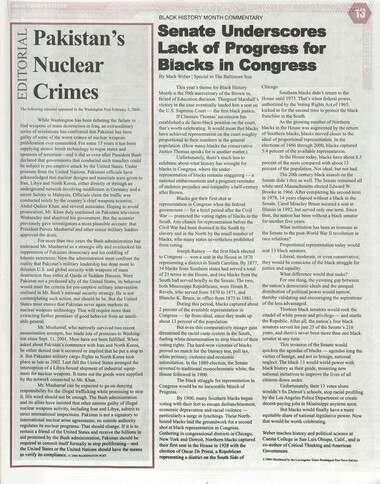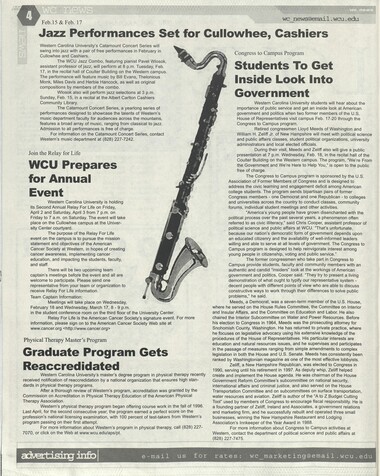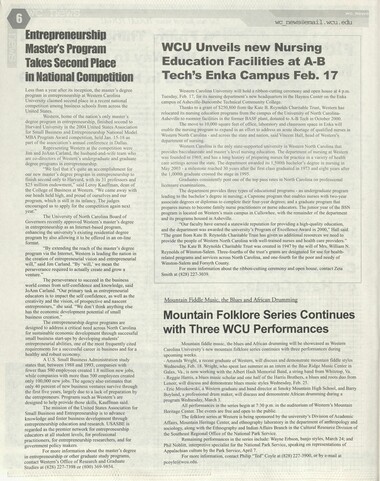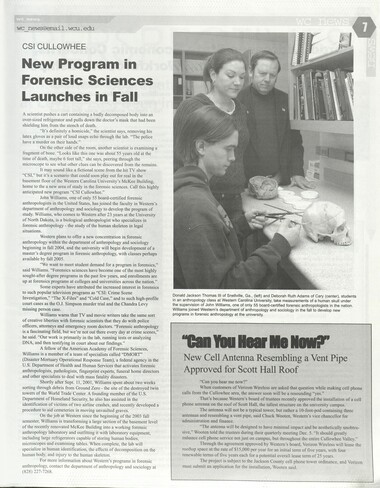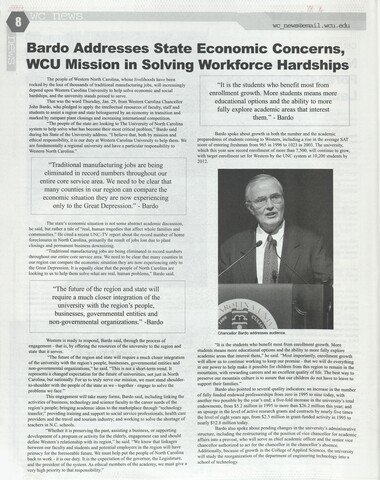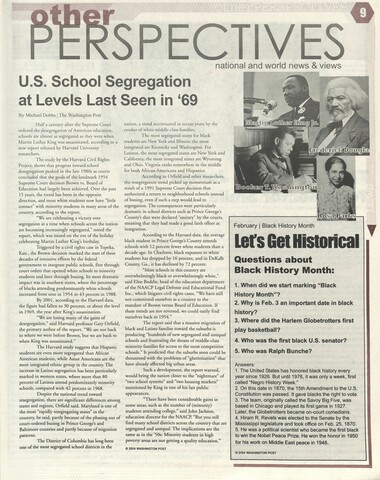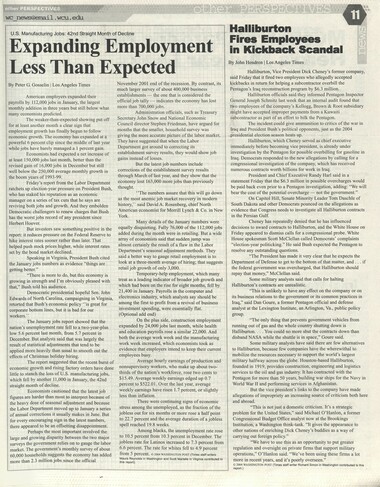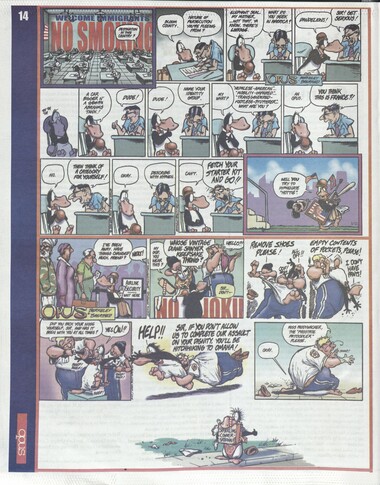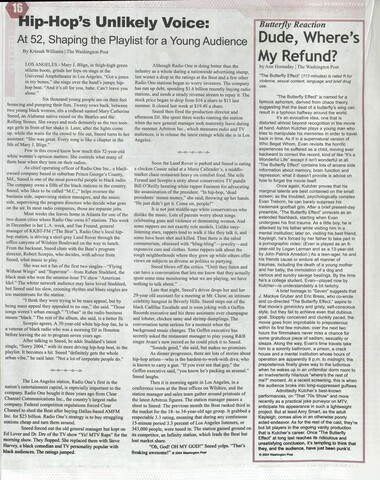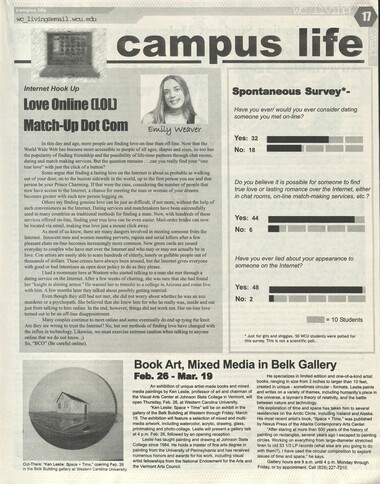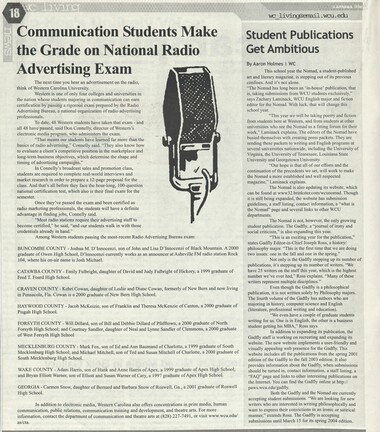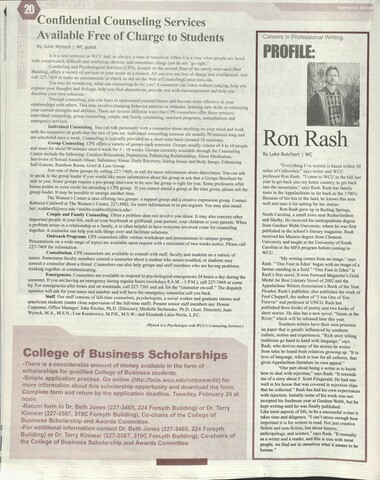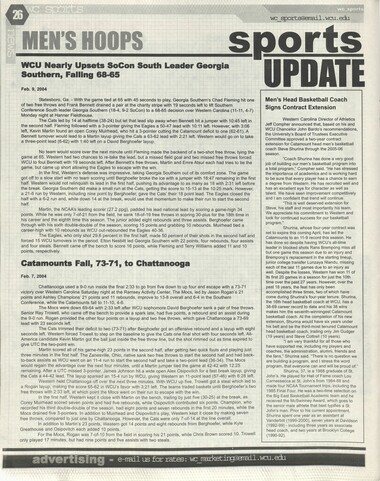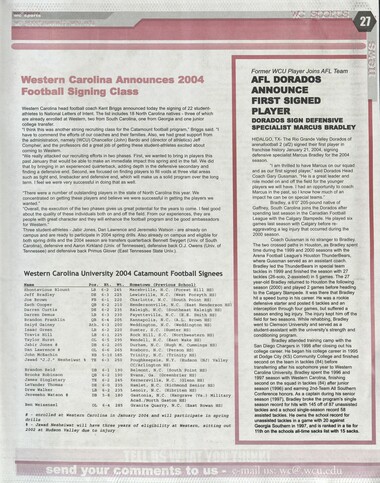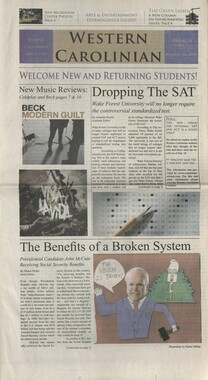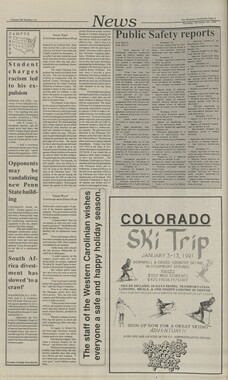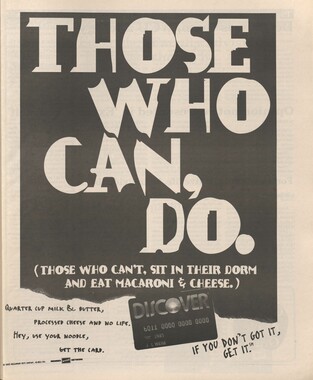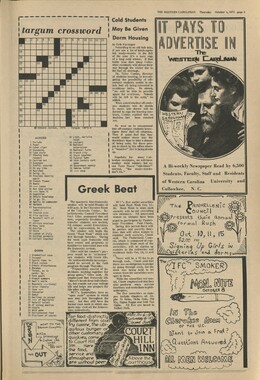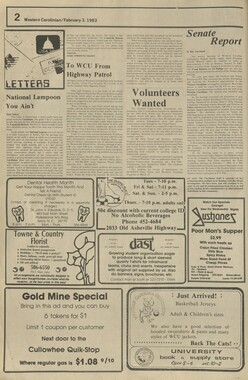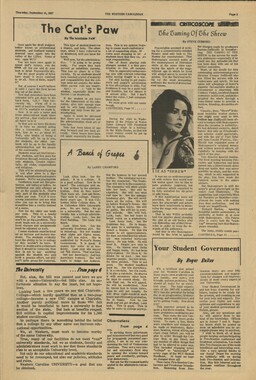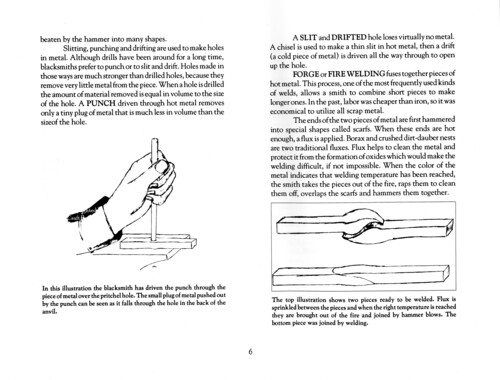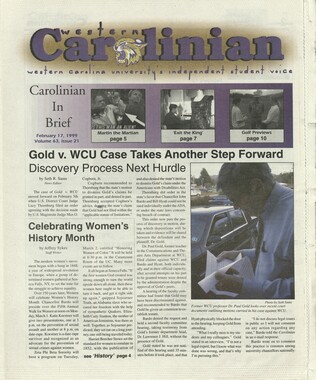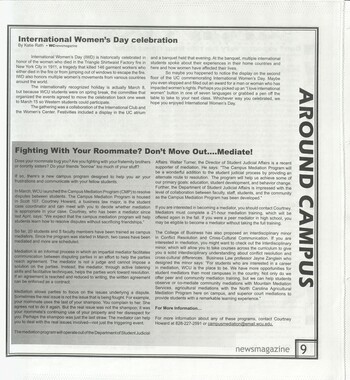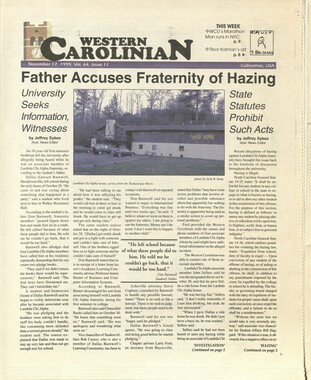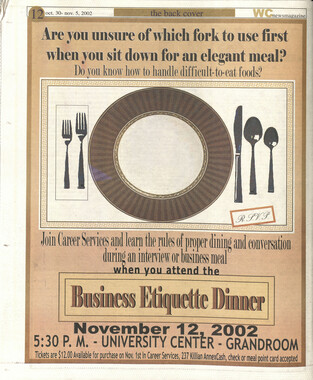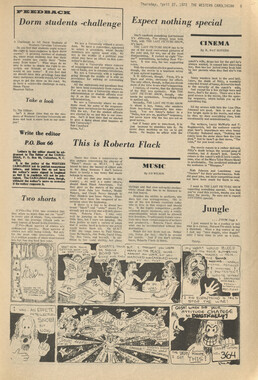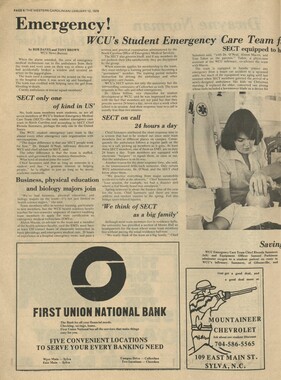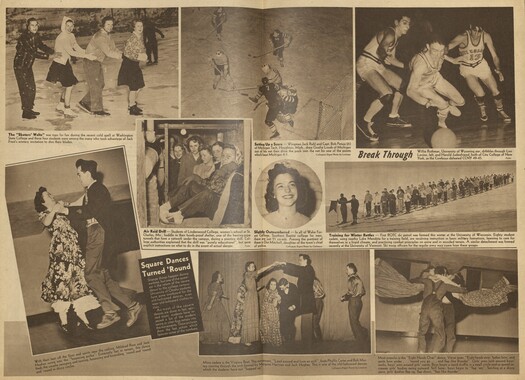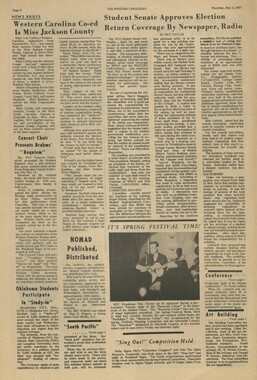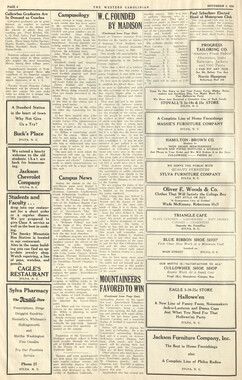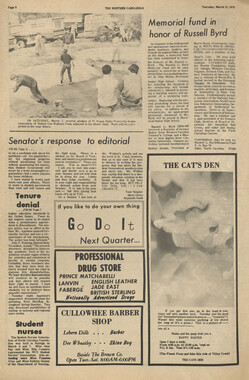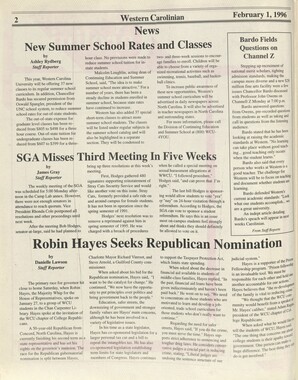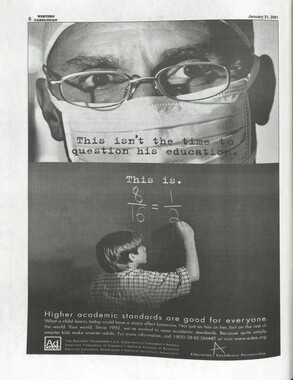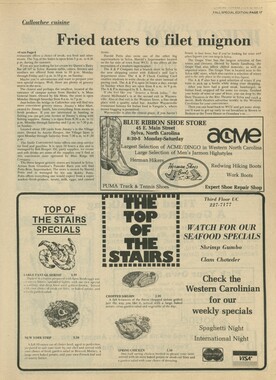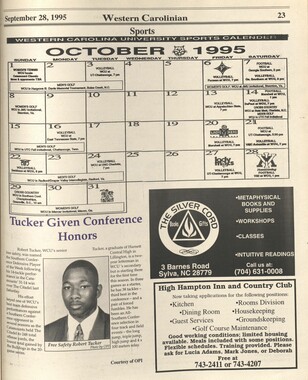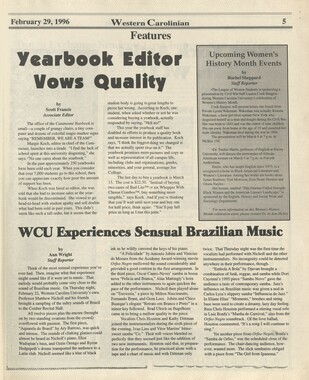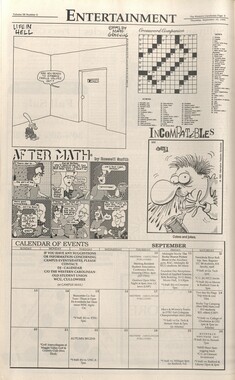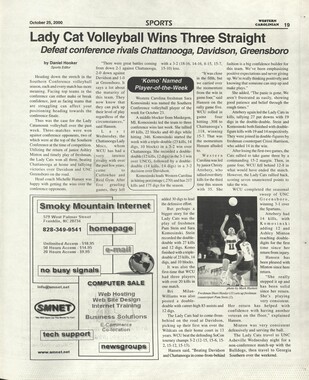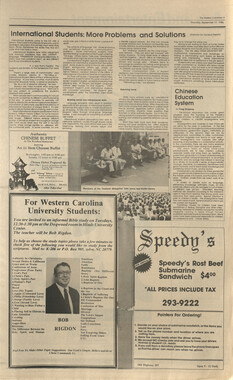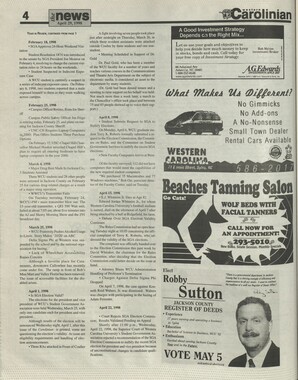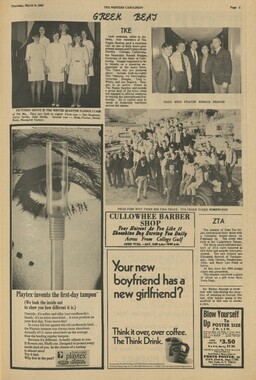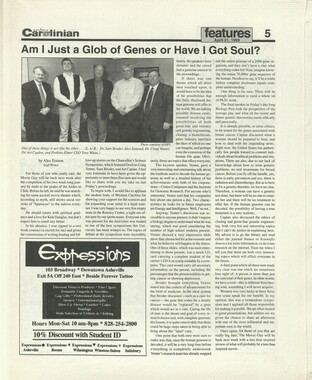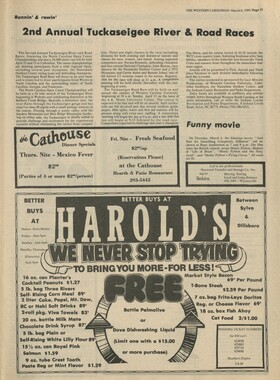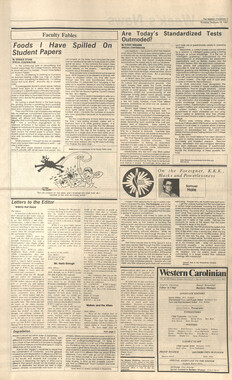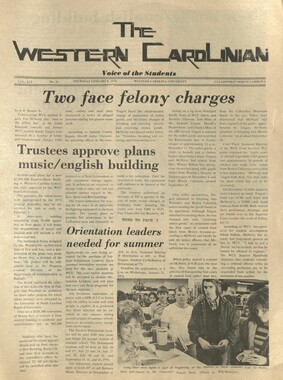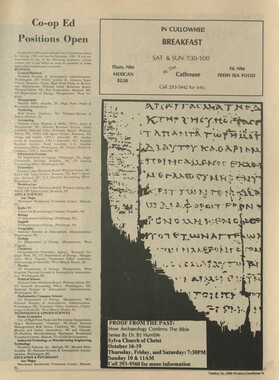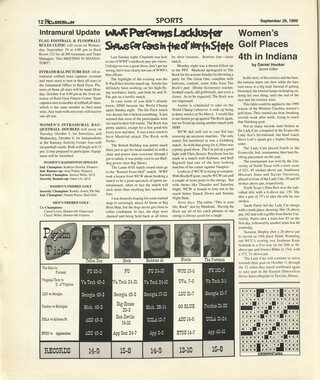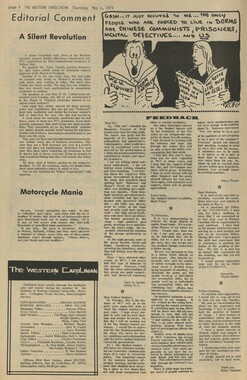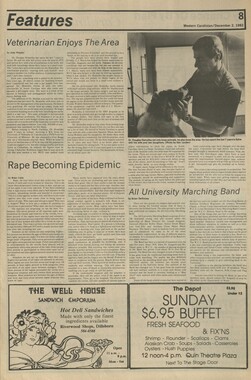Western Carolina University (21)
View all
- Canton Champion Fibre Company (2308)
- Cherokee Traditions (291)
- Civil War in Southern Appalachia (165)
- Craft Revival (1942)
- George Masa Collection (137)
- Great Smoky Mountains - A Park for America (3080)
- Highlights from Western Carolina University (422)
- Horace Kephart (973)
- Journeys Through Jackson (159)
- LGBTQIA+ Archive of Jackson County (89)
- Oral Histories of Western North Carolina (318)
- Picturing Appalachia (6617)
- Stories of Mountain Folk (413)
- Travel Western North Carolina (153)
- Western Carolina University Fine Art Museum Vitreograph Collection (129)
- Western Carolina University Herbarium (92)
- Western Carolina University: Making Memories (738)
- Western Carolina University Publications (2491)
- Western Carolina University Restricted Electronic Theses and Dissertations (146)
- Western North Carolina Regional Maps (71)
- World War II in Southern Appalachia (131)
University of North Carolina Asheville (6)
View all
- Allanstand Cottage Industries (62)
- Appalachian National Park Association (53)
- Bennett, Kelly, 1890-1974 (1463)
- Berry, Walter (76)
- Brasstown Carvers (40)
- Carver, George Washington, 1864?-1943 (26)
- Cathey, Joseph, 1803-1874 (1)
- Champion Fibre Company (233)
- Champion Paper and Fibre Company (297)
- Cherokee Indian Fair Association (16)
- Cherokee Language Program (22)
- Crowe, Amanda (40)
- Edmonston, Thomas Benton, 1842-1907 (7)
- Ensley, A. L. (Abraham Lincoln), 1865-1948 (275)
- Fromer, Irving Rhodes, 1913-1994 (70)
- George Butz (BFS 1907) (46)
- Goodrich, Frances Louisa (120)
- Grant, George Alexander, 1891-1964 (96)
- Heard, Marian Gladys (60)
- Kephart, Calvin, 1883-1969 (15)
- Kephart, Horace, 1862-1931 (313)
- Kephart, Laura, 1862-1954 (67)
- Laney, Gideon Thomas, 1889-1976 (439)
- Masa, George, 1881-1933 (61)
- McElhinney, William Julian, 1896-1953 (44)
- Niggli, Josephina, 1910-1983 (10)
- North Carolina Park Commission (105)
- Osborne, Kezia Stradley (9)
- Owens, Samuel Robert, 1918-1995 (11)
- Penland Weavers and Potters (36)
- Roberts, Vivienne (15)
- Roth, Albert, 1890-1974 (142)
- Schenck, Carl Alwin, 1868-1955 (1)
- Sherrill's Photography Studio (2565)
- Southern Highland Handicraft Guild (127)
- Southern Highlanders, Inc. (71)
- Stalcup, Jesse Bryson (46)
- Stearns, I. K. (213)
- Thompson, James Edward, 1880-1976 (226)
- United States. Indian Arts and Crafts Board (130)
- USFS (683)
- Vance, Zebulon Baird, 1830-1894 (1)
- Weaver, Zebulon, 1872-1948 (58)
- Western Carolina College (230)
- Western Carolina Teachers College (282)
- Western Carolina University (2008)
- Western Carolina University. Mountain Heritage Center (18)
- Whitman, Walt, 1819-1892 (10)
- Wilburn, Hiram Coleman, 1880-1967 (73)
- Williams, Isadora (3)
- Cain, Doreyl Ammons (0)
- Crittenden, Lorraine (0)
- Rhodes, Judy (0)
- Smith, Edward Clark (0)
- Appalachian Region, Southern (3032)
- Asheville (N.C.) (1945)
- Avery County (N.C.) (26)
- Blount County (Tenn.) (195)
- Buncombe County (N.C.) (1680)
- Cherokee County (N.C.) (283)
- Clay County (N.C.) (556)
- Graham County (N.C.) (238)
- Great Smoky Mountains National Park (N.C. and Tenn.) (525)
- Haywood County (N.C.) (3573)
- Henderson County (N.C.) (70)
- Jackson County (N.C.) (4925)
- Knox County (Tenn.) (35)
- Knoxville (Tenn.) (13)
- Lake Santeetlah (N.C.) (10)
- Macon County (N.C.) (421)
- Madison County (N.C.) (216)
- McDowell County (N.C.) (39)
- Mitchell County (N.C.) (135)
- Polk County (N.C.) (35)
- Qualla Boundary (982)
- Rutherford County (N.C.) (78)
- Swain County (N.C.) (2185)
- Transylvania County (N.C.) (270)
- Watauga County (N.C.) (12)
- Waynesville (N.C.) (86)
- Yancey County (N.C.) (72)
- Aerial Photographs (3)
- Aerial Views (60)
- Albums (books) (4)
- Articles (1)
- Artifacts (object Genre) (228)
- Bibliographies (1)
- Biography (general Genre) (2)
- Cards (information Artifacts) (38)
- Clippings (information Artifacts) (192)
- Copybooks (instructional Materials) (3)
- Crafts (art Genres) (622)
- Depictions (visual Works) (21)
- Design Drawings (1)
- Digital Moving Image Formats (2)
- Drawings (visual Works) (185)
- Envelopes (101)
- Exhibitions (events) (1)
- Facsimiles (reproductions) (1)
- Fiction (general Genre) (4)
- Financial Records (12)
- Fliers (printed Matter) (67)
- Glass Plate Negatives (381)
- Guidebooks (2)
- Internegatives (10)
- Interviews (823)
- Land Surveys (102)
- Letters (correspondence) (1045)
- Manuscripts (documents) (618)
- Maps (documents) (177)
- Memorandums (25)
- Minutes (administrative Records) (59)
- Negatives (photographs) (6090)
- Newsletters (1290)
- Newspapers (2)
- Notebooks (8)
- Occupation Currency (1)
- Paintings (visual Works) (1)
- Pen And Ink Drawings (1)
- Periodicals (194)
- Personal Narratives (10)
- Photographs (12977)
- Plans (maps) (1)
- Poetry (6)
- Portraits (4568)
- Postcards (329)
- Programs (documents) (181)
- Publications (documents) (2444)
- Questionnaires (65)
- Relief Prints (26)
- Sayings (literary Genre) (1)
- Scrapbooks (282)
- Sheet Music (2)
- Slides (photographs) (402)
- Songs (musical Compositions) (2)
- Sound Recordings (802)
- Specimens (92)
- Speeches (documents) (18)
- Tintypes (photographs) (8)
- Transcripts (329)
- Text Messages (0)
- A.L. Ensley Collection (275)
- Appalachian Industrial School Records (7)
- Appalachian National Park Association Records (336)
- Axley-Meroney Collection (2)
- Bayard Wootten Photograph Collection (20)
- Bethel Rural Community Organization Collection (7)
- Blumer Collection (5)
- C.W. Slagle Collection (20)
- Canton Area Historical Museum (2110)
- Carlos C. Campbell Collection (462)
- Cataloochee History Project (64)
- Cherokee Studies Collection (4)
- Daisy Dame Photograph Album (5)
- Daniel Boone VI Collection (1)
- Doris Ulmann Photograph Collection (112)
- Elizabeth H. Lasley Collection (1)
- Elizabeth Woolworth Szold Fleharty Collection (4)
- Frank Fry Collection (95)
- George Masa Collection (173)
- Gideon Laney Collection (452)
- Hazel Scarborough Collection (2)
- Hiram C. Wilburn Papers (28)
- Historic Photographs Collection (236)
- Horace Kephart Collection (861)
- Humbard Collection (33)
- Hunter and Weaver Families Collection (1)
- I. D. Blumenthal Collection (4)
- Isadora Williams Collection (4)
- Jesse Bryson Stalcup Collection (47)
- Jim Thompson Collection (224)
- John B. Battle Collection (7)
- John C. Campbell Folk School Records (80)
- John Parris Collection (6)
- Judaculla Rock project (2)
- Kelly Bennett Collection (1482)
- Love Family Papers (11)
- Major Wiley Parris Civil War Letters (3)
- Map Collection (12)
- McFee-Misemer Civil War Letters (34)
- Mountain Heritage Center Collection (4)
- Norburn - Robertson - Thomson Families Collection (44)
- Pauline Hood Collection (7)
- Pre-Guild Collection (2)
- Qualla Arts and Crafts Mutual Collection (12)
- R.A. Romanes Collection (681)
- Rosser H. Taylor Collection (1)
- Samuel Robert Owens Collection (94)
- Sara Madison Collection (144)
- Sherrill Studio Photo Collection (2558)
- Smoky Mountains Hiking Club Collection (616)
- Stories of Mountain Folk - Radio Programs (374)
- The Reporter, Western Carolina University (510)
- Venoy and Elizabeth Reed Collection (16)
- WCU Gender and Sexuality Oral History Project (36)
- WCU Mountain Heritage Center Oral Histories (25)
- WCU Oral History Collection - Mountain People, Mountain Lives (71)
- WCU Students Newspapers Collection (1923)
- Western North Carolina Tomorrow Black Oral History Project (69)
- William Williams Stringfield Collection (2)
- Zebulon Weaver Collection (109)
- African Americans (390)
- Appalachian Trail (35)
- Artisans (521)
- Cherokee art (84)
- Cherokee artists -- North Carolina (10)
- Cherokee language (21)
- Cherokee pottery (101)
- Cherokee women (208)
- Church buildings (190)
- Civilian Conservation Corps (U.S.) (111)
- College student newspapers and periodicals (2012)
- Dams (108)
- Dance (1023)
- Education (222)
- Floods (63)
- Folk music (1015)
- Forced removal, 1813-1903 (2)
- Forest conservation (220)
- Forests and forestry (1198)
- Gender nonconformity (4)
- Great Smoky Mountains National Park (N.C. and Tenn.) (181)
- Hunting (47)
- Landscape photography (25)
- Logging (122)
- Maps (83)
- Mines and mineral resources (9)
- North Carolina -- Maps (18)
- Paper industry (38)
- Postcards (255)
- Pottery (135)
- Railroad trains (72)
- Rural electrification -- North Carolina, Western (3)
- School integration -- Southern States (2)
- Segregation -- North Carolina, Western (5)
- Slavery (5)
- Sports (452)
- Storytelling (243)
- Waterfalls -- Great Smoky Mountains (N.C. and Tenn.) (66)
- Weaving -- Appalachian Region, Southern (280)
- Wood-carving -- Appalachian Region, Southern (328)
- World War, 1939-1945 (173)
Western Carolinian Volume 68 Number 08
Item
Item’s are ‘child’ level descriptions to ‘parent’ objects, (e.g. one page of a whole book).
-
-
: Pakistans Nuclear > Crimes The following editorial appeared in the Washington Post February 5, 2004 : EDITORIAL | While Washington has been debating the failure to find weapons of mass destruction in Iraq, an extraordinary series of revelations has confirmed that Pakistan has been guilty of some of the worst crimes of nuclear weapons proliferation ever committed. For some 15 years it has been supplying atomic bomb technology to rogue states and _ sponsors of terrorismand it did so even after President Bush declared that governments that conducted such transfers could be subject to pre-emptive attack by the United States. Under pressure from the United Nations, Pakistani officials have acknowledged that nuclear designs and materials were given to Iran, Libya and North Korea, either directly or through an underground network involving middlemen in Germany and a secret factory in Malaysia. Officials claim the traffic was conducted solely by the countrys chief weapons scientist, Abdul Qadeer Khan, and several associates. Hoping to avoid prosecution, Mr. Khan duly confessed on Pakistani television Wednesday and absolved his government. But the scientist previously gave investigators a more plausible account: that President Pervez Musharraf and other senior military leaders approved the deals. For more than two years the Bush administration has embraced Mr. Musharraf as a strategic ally and overlooked his suppression of Pakistani democracy and his coddling of Islamic extremists. Now the administration must confront the reality that Pakistans military leadership has done more to threaten U.S. and global security with weapons of mass destruction than either al-Qaida or Saddam Hussein. Were Pakistan not a professed ally of the United States, its behavior would meet the criteria for pre-emptive military intervention outlined in Mr. Bushs national security strategy. He is not contemplating such action, nor should he be. But the United States must ensure that Pakistan never again markets its nuclear weapons technology. That will require more than extracting further promises of good behavior from an unreli- able general. Mr. Musharraf, who narrowly survived two recent assassination attempts, has made lots of promises to Washing- ton since Sept. 11, 2001. Most have not been fulfilled. When asked about Pakistans commerce with Iran and North Korea, he either denied that it occurred or implied that he put a stop to it. But Pakistani military cargo flights to North Korea took place as late as 2002. Last fall the United States arranged the interception of a Libya-bound shipment of industrial equip- ment for nuclear weapons. It turns out the goods were supplied by the network connected to Mr. Khan. Mr. Musharraf can be expected to go on denying responsibility for the illegal trafficking while promising to stop it. His word should not be enough. The Bush administration and its allies have insisted that other nations guilty of illegal nuclear weapons activity, including Iran and Libya, submit to strict international inspections. Pakistan is not a signatory to international nuclear arms agreements; no outside authority regulates its nuclear programs. That should change. If it is to remain a friend of the United States and receive the billions in aid promised by the Bush administration, Pakistan should be required to commit itself formally to stop proliferatingand _ the United States or the United Nations should have the means to verify its compliance. 2004 wasHINGTON Post BLACK HISTORY MONTH COMMENTARY Senate Underscores Lack of Progress for Biacks in Congress By Mark Weber | Special to The Baltimore Sun This years theme for Black History Month is the 50th anniversary of the Brown vs. Board of Education decision. Thurgood Marshalls victory in the case eventually landed him a seat on the U.S. Supreme Court the first black justice. If Clarence Thomas succession has established a de facto black position on the court, thats worth celebrating. It would mean that blacks have achieved representation on the court roughly proportional to their numbers in the general population. (How many blacks the conservative Justice Thomas speaks for is another matter.) Unfortunately, theres much less to celebrate about what history has wrought for blacks in Congress, where the under- representation of blacks remains staggering a national embarrassment and a poignant reminder of endemic prejudice and inequality a half-century after Brown. Blacks got their first shot at representation in Congress when the federal government for a brief period after the Civil War protected the voting rights of blacks in the South. Any chance for representation before the Civil War had been doomed in the South by slavery and in the North by the small number of blacks, who many states nevertheless prohibited from voting. Joseph Rainey the first black elected to Congress won a seat in the House in 1870 representing a district in South Carolina. By 1877, 14 blacks from Southern states had served a total of 21 terms in the House, and two blacks from the South had served briefly in the Senate. The two, both Mississippi Republicans, were Hiram R. Revels, who served from 1870 to 1871, and Blanche K. Bruce, in office from 1875 to 1881. During this period, blacks captured about 2 percent of the available representation in Congress far from ideal, since they made up about 13 percent of the population. But even this comparatively meager gain threatened the racial caste system in the South, fueling white determination to strip blacks of their voting rights. The hard-won victories of blacks proved no match for the literacy test, poll tax, white primary, violence and economic intimidation. In the 1880 election, the Senate reverted to traditional monochromatic white; the House followed in 1900. The black struggle for representation in Congress would be no inexorable March of Progress. By 1900, many Southern blacks began voting with their feet to escape disfranchisement, economic depravation and racial violence particularly a surge in lynchings. These North- bound blacks laid the groundwork for a second shot at black representation in Congress. Gathering in congressional districts in Chicago, New York and Detroit, Northern blacks captured their first seat in the House in 1928 with the election of Oscar De Priest, a Republican representing a district on the South Side of Chicago. Southern blacks didnt return to the House until 1973. Thats when federal power, authorized by the Voting Rights Act of 1965, kicked in for the second time to protect the black franchise in the South. As the growing number of Northern blacks in the House was augmented by the return of Southern blacks, blacks moved closer to the ideal of proportional representation. In the elections of 1966 through 2000, blacks captured 5.4 percent of the available representation. In the House today, blacks have about 8.5 percent of the seats compared with about 13 percent of the population. Not ideal, but not bad. The 20th century black assault on the Senate didnt fare as well. The Senate remained all white until Massachusetts elected Edward W. Brooke in 1966. After completing his second term in 1978, 14 years elapsed without a black in the Senate. Carol Moseley Braun secured a seat in Illinois in 1992, but served only one term. Since then, the nation has been without a black senator for another five years. What institution has been as immune as the Senate to the post-World War II revolution in race relations? Proportional representation today would seat 13 black senators. Liberal, moderate, or even conservative, they would be conscious of the black struggle for justice and equality. What difference would that make? For one thing, the yawning gap between the nations democratic ideals and the unequal distribution of political power would narrow, thereby validating and encouraging the aspirations of the less advantaged. Thirteen black senators would rock the citadel of white power and privilege and startle the Republic. After all, the nations four black senators served for just 25 of the Senates 216 years, and theres never been more than one black senator at any time. This invasion of the Senate would quicken the agendas of blacks agendas long the victim of benign, and not so benign, national neglect. The black 13 would wield power with black history as their guide, mounting new national initiatives to improve the lives of all citizens down under. Unfortunately, their 13 votes alone wouldnt fix Detroits schools, stop racial profiling by the Los Angeles Police Department or create decent-paying jobs in Mississippi anytime soon. But blacks would finally have a more equitable share of national legislative power. Now that would be worth celebrating. Weber teaches history and political science at Cuesta College in San Luis Obispo, Calif., and is co-author of Critical Thinking and American Government. 2004 Distributed by the Los Angeles Times-Washington Post News Service
Object
Object’s are ‘parent’ level descriptions to ‘children’ items, (e.g. a book with pages).
-
The Western Carolinian is Western Carolina University's student-run newspaper. The paper was published as the Cullowhee Yodel from 1924 to 1931 before changing its name to The Western Carolinian in 1933.
-
